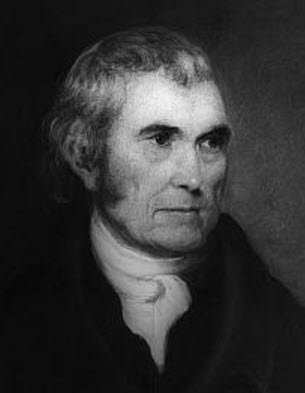
Named to a commission of three American diplomats he was sent to Paris in 1797 by President Adams to negotiate normalization of relations with revolutionary France. Ill treatment of the American delegation by the French Foreign Minister Talleyrand and his representatives led to the “XYZ Affair” which embarrassed the Democratic-Republicans under Jefferson who had been savagely skeptical of Adams’s claims of French mistreatment of the American diplomats. More importantly it almost brought the two countries close to war.
A distant relative of Jefferson’s but an opponent of Jeffersonian republicanism, and of the course of the French Revolution, Marshall was cynical about a peaceful resolution to the conflict with France. Later Secretary of State under Adams it was in Marshall’s office that Adams’s late hour appointments of Federalist judges caused the controversy quickly dubbed by Jefferson as the “Midnight Appointments.”
Appointed Chief Justice of the Supreme Court by Adams, Marshall’s ruling on one of the late appointed judges in the Marbury v. Madison case established judicial oversight by the Supreme Court and gave that body essentially equal authority in the Constitutional “checks and balances” regime. Jefferson vigorously opposed this new authority of the court as undermining the people’s authority over the government through their votes and particularly lacking effective means of redress against the court. Marshall’s influence on American jurisprudence and on American politics is immense.
Adams considered his appointment of Marshall to the Court the greatest gift he gave to the American people. A scholar and author, his multi-volume biography of George Washington would be unexpectedly germane in a controversial matter involving Jefferson.